The stages of Alzheimer's disease
Alzheimer's disease is usually described in terms of stages, indicating the severity of the symptoms. Learn about the stages on this page, from early stage to end of life.

Progression from stage to stage
- Alzheimer's disease is a brain condition where brain cells progressively degenerate.
- Alzheimer's disease typically follows certain stages that bring about different changes in that person's life, as well as the lives of their caregivers.
- Because Alzheimer's disease affects each person differently, the symptoms, the order in which they appear, and the time spent in each stage may be different between people.
- In most cases, the progression is slow, and the symptoms of each stage may overlap, often making the move from one stage to another difficult to notice.
(Specific to Alzheimer's disease only.) This document is one in a five-part series on the stages of Alzheimer’s disease and is written for the person with the disease, their family and caregivers. This overview provides a summary of the stages and information on end-of-life issues.
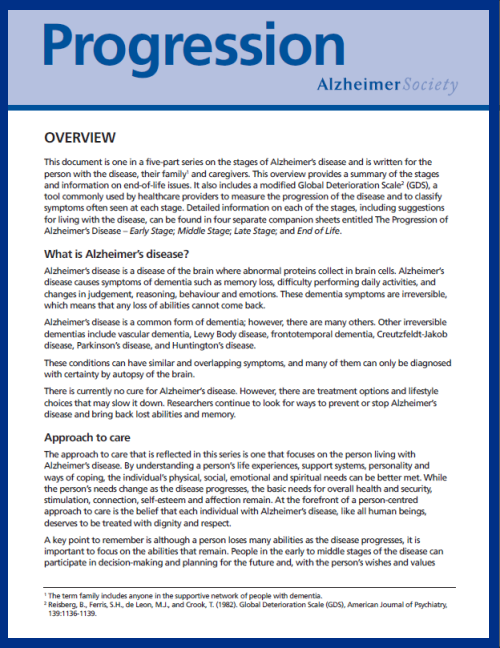
The early stage
Early stage refers to people of any age who have mild impairment due to symptoms of Alzheimer’s disease.
Common symptoms include:
- Forgetfulness,
- Difficulty learning new things and following conversations,
- Difficulty concentrating or limited attention span,
- Mood changes including apathy and depression and
- Mild co-ordination problems.
These symptoms may not be easy to notice. The person in the early stage keeps many of their abilities and assistance may not be needed, or requested. However, they may start to experience problems, like difficulty completing a task at work that the person used to do well.
The person may understand their changing abilities and can tell others about their experience. They may also be able to take steps to plan for their future care and finances.
(Specific to Alzheimer's disease only.) This document is one in a five-part series on the stages of Alzheimer’s disease and is written for the person with Alzheimer's disease and caregivers. The early stage of Alzheimer's disease is featured in this sheet.
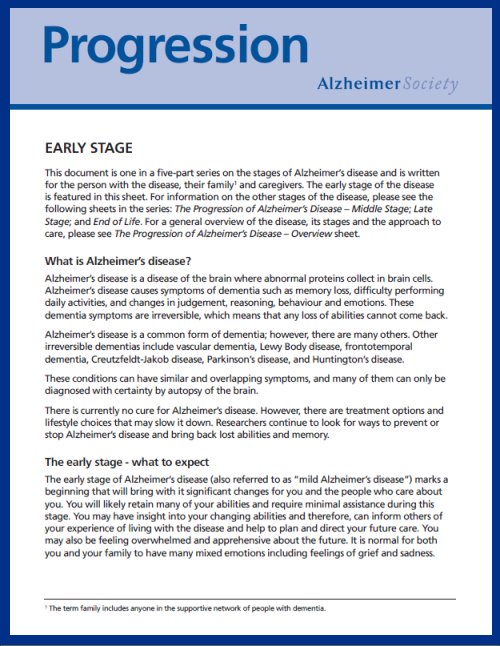
The middle stage
The middle stage brings a greater decline in the person’s cognitive and abilities. This stage often seems the longest and everyone involved will need help and support.
Memory and other cognitive abilities will continue to deteriorate, although the person may still have some awareness of their condition.
For caregivers, this is the point where:
- Their involvement in the person's care greatly increases,
- Moving the person to a long-term care home may be considered for the first time,
- Programs and services in your community can be a big help, providing adult day programs, respite care and more,
- Everyone involved will need help and support because of the increasing changes experienced by the person living with Alzheimer's disease.
(Specific to Alzheimer's disease only.) This document is one in a five-part series on the stages of Alzheimer’s disease and is written for the person living with Alzheimer's disease and caregivers. The middle stage of Alzheimer's disease is featured in this sheet.
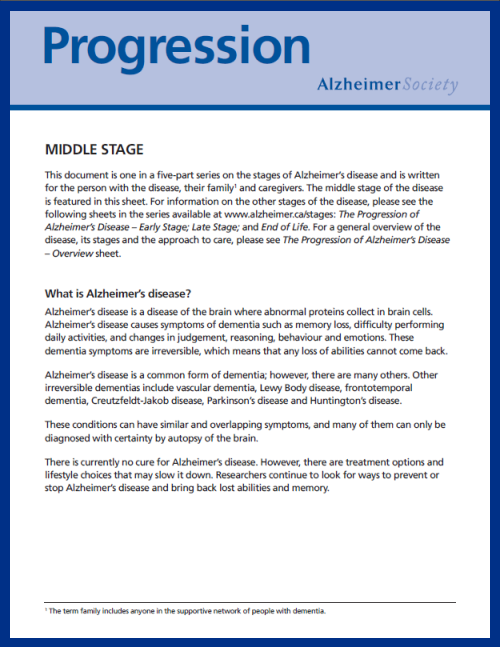
The late stage
The late stage of Alzheimer’s disease may also be called the “severe” or “advanced” stage.
In this stage, the person living with Alzheimer's disease eventually becomes unable to communicate verbally or look after themselves. Nonverbal communication becomes more important.
The person in the late stage of Alzheimer's disease will experience:
- Severe impairment in memory, processing new information and recognizing time and place,
- Losing capacity for recognizable speech and
- The loss of the ability to eat, walk and use the toilet without assistance.
Care may be required 24 hours a day. At this stage, it's important for caregivers to continue to support the person to provide the highest quality of life possible.
(Specific to Alzheimer's disease only.) This document is one in a five-part series on the stages of Alzheimer’s disease and is written for the person living with Alzheimer's disease and caregivers. The late stage of Alzheimer’s disease is featured in this sheet.
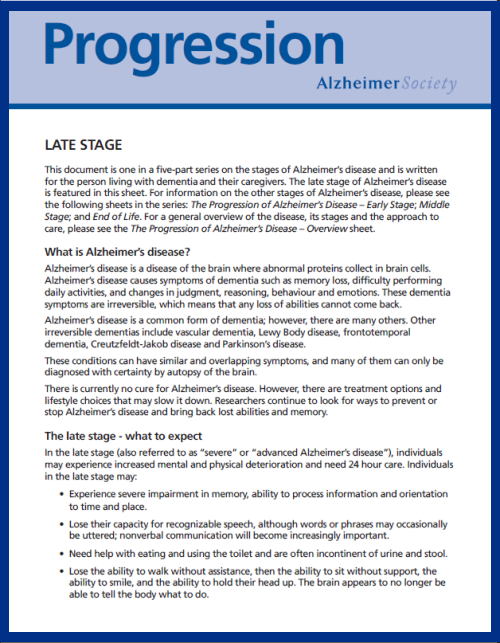
End of life
The person in the final months of Alzheimer's disease will experience increased mental and physical deterioration, eventually needing 24-hour care.
When the person nears end of life, the focus is on palliative care and comfort. Still, it's important to respect the person's wishes as they would have wanted.
As with the care of someone living with a terminal illness, the person's physical, emotional and spiritual needs must be cared for so they are as comfortable as possible when the time of passing comes.
(Specific to Alzheimer's disease only.) This document is one in a five-part series on the stages of Alzheimer’s disease and is written for the person living with Alzheimer's disease and caregivers. The end of life stage of Alzheimer's disease is featured in this sheet.
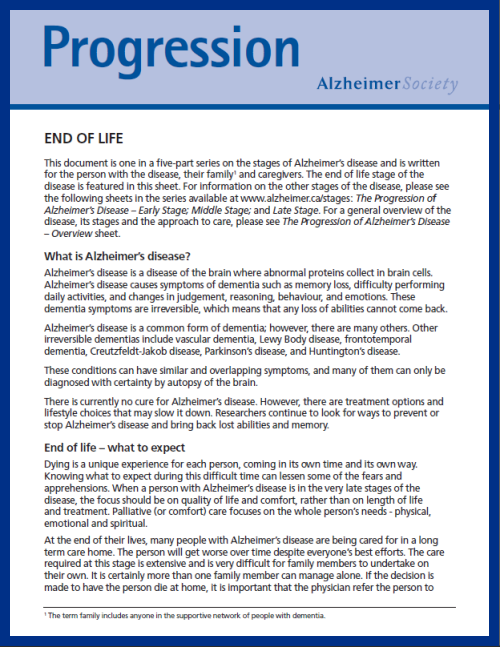
The needs of people living with dementia at the end of life are unique and require special considerations. Please visit our section on end-of-life care to learn more.
Get a diagnosis
To help fight the symptoms of Alzheimer's disease and slow the progression into the later stages, it's important to be diagnosed as early as possible. If you're concerned that you may have Alzheimer's disease or other dementia, find out about how to get a diagnosis.
How do I treat Alzheimer's disease?
There is currently no cure for Alzheimer's disease, nor can its progression be reversed. Current treatment options and brain-healthy lifestyle choices, however, can often significantly slow the progression.
References
- References
-
Reisberg B., Ferris, S.H., de Leon, M.J., and Crook, T. (1982). The Global Deterioration Scale for assessment of primary degenerative dementia. Am J Psychiatry, 139(9): 1136-9. doi: 10.1176/ajp.139.9.1136.
